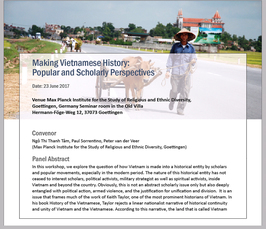"Making Vietnamese History: Popular and Scholarly Perspectives"
Workshops, conferences 2017
- Date: Jun 23, 2017
- Location: MPI-MMG, Hermann-Föge-Weg 12, Göttingen
- Room: Conference Room

For more details please contact vdvoffice(at)mmg.mpg.de.
Taking up Taylor’s proposal, this workshop is envisaged as a deep
conversation and direct engagement between history and anthropology.
With the participation of historians (including Taylor himself) and
anthropologists, we aim to juxtapose a “Vietnamese history” as preserved
in archives with a “Vietnamese history” that lives in oral, social
history and popular movements. As a result we hope to come to a better
understanding of the role of history and historiography in shaping
political actions and cultural discourses in Vietnam today. The main
purpose of such an interaction would be to get a more informed
understanding what is at stake in the division of North and South
Vietnam, of Vietnam in relation to ‘China’, as well as the place of the
Khmer in Vietnam; but also to think about the relation between ‘official
history’ and ‘popular history’. We are thinking of short presentations
of thoughts related to past or current research and much time for
discussion.
It is an issue that frames much of the work of Keith Taylor, one of the most prominent historians of Vietnam. In his book History of the Vietnamese, Taylor rejects a linear nationalist narrative of historical continuity and unity of Vietnam and the Vietnamese. According to this narrative, the land that is called Vietnam today is a product of spatial expansion, southward from Red River Delta, by the people who have been unified by common language (Vietnamese) and a powerful spirit to resist foreign invasion and rule. In an attempt to move beyond the propaganda of memory and memorializing yet without falling into a symmetrical narrative of resistance to the state, Taylor proposes to explore instead the possibility of imagining Asian surfaces as something other than already teleologically conceived parts of a nation to be, and by doing that to go beyond both nation and region.
Convenor
Ngô Thi Thanh Tâm, Paul Sorrentino, Peter van der Veer
(Max Planck Institute for the Study of Religious and Ethnic Diversity, Goettingen)
09.30-11.30 Part I: History
-
Keith Taylor (Cornell University):
Vietnamese historiography between options and the norm -
Olga Dror (Texas University):
The two Vietnams: socializing the new generation in the DRV and the RVN (1965-1975) -
Pascal Bourdeaux (Ecole Pratique des Hautes Etudes):
Religious history and its quest for autonomy: first comments on the interactions between history and religion in the case of Viêt Nam
11.30-12.30 Lunch
12.30-14.30 Part II: Anthropology
-
Tam Ngo (Max Planck Institute):
Between a rock and a hard place: sacred geography and
spiritual warfare against China in Vietnam -
Paul Sorrentino (Max Planck Institute):
Sinicized bureaucracy and Vietnamese autochtony in the Four Palace worship -
Peter van der Veer (Max Planck Institute):
Nation and nationalism from a comparative perspective
14.30-15.00 Short (ten minutes) presentations of the work of
Vuong Ngoc Thi (on Nung residents of Sino-Vietnamese borderland) and Mai Thanh Nga (on Vietnamese immigrants in Berlin)
15.00-18.00 Podium discussion
18.00-19.00 Dinner
19.00-20.00 Project discussion